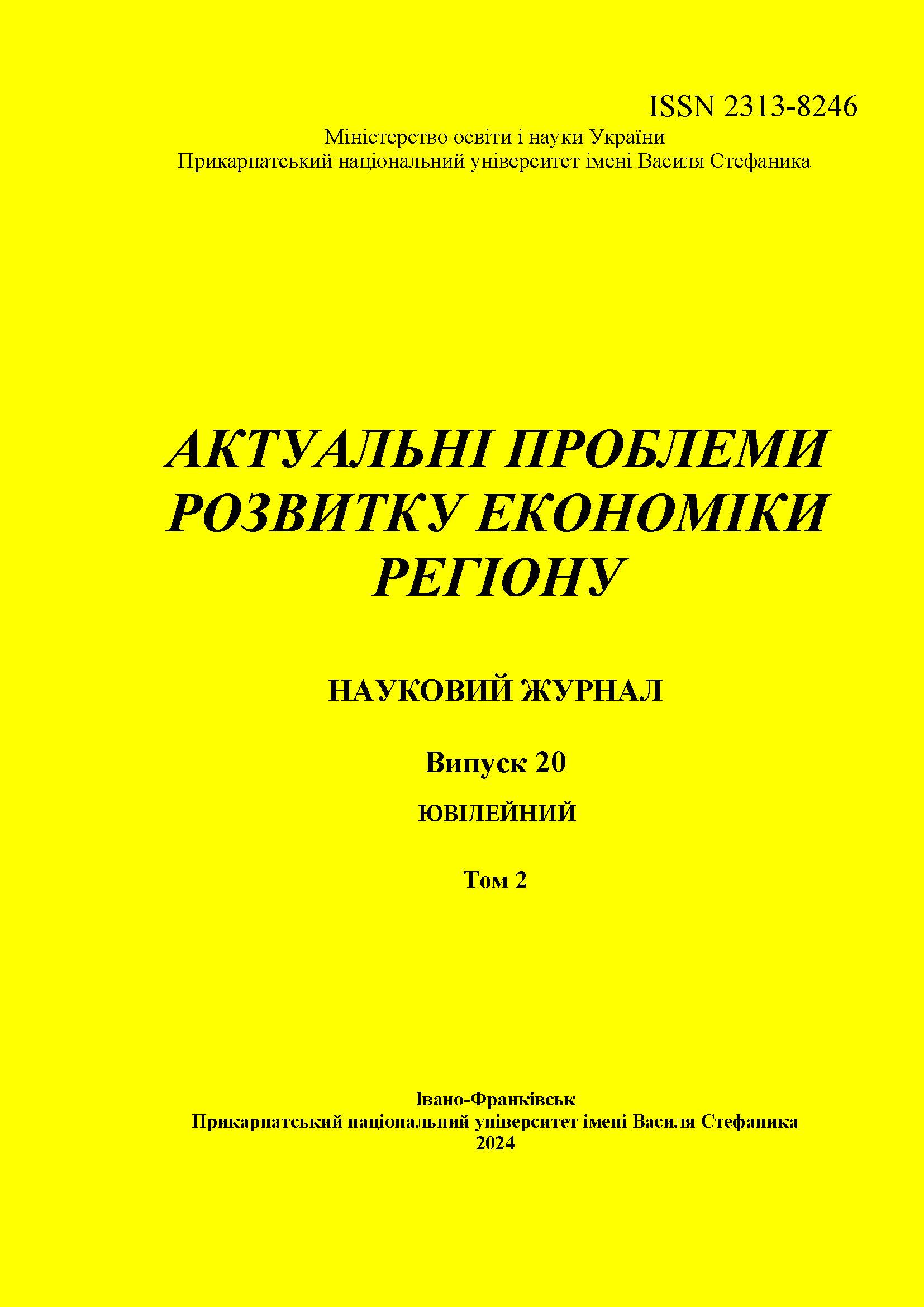ACCOUNTING AND ANALYTICAL SUPPORT AND ECONOMIC CONTROL OF COMPANIES' STAFF PAYMENT CALCULATIONS USING DIGITAL TECHNOLOGIES AND MANAGEMENT OF GRANT ACTIVITIES
DOI:
https://doi.org/10.15330/apred.2.20.325-335Keywords:
accounting and analytical support, economic control, payroll calculations, digital technologies, management of grant activitiesAbstract
The article is directed to the study of the main aspects of the application of digital technologies for accounting and economic control of payroll calculations of the company's personnel, including the analysis of the effectiveness of the use of digital tools, their impact on the productivity and efficiency of personnel management, the identification of advantages and possible limitations of their use in this context, as well as management of grant activities.
The purpose of the article is to study the use of digital technologies for accounting and economic control of payments for enterprise personnel and grant activities.
To achieve the goal, research methods are used in the article, namely: induction and deduction – to determine the main advantages and disadvantages of digital technologies for accounting and economic control of calculations for the remuneration of the company's personnel; system analysis – for the study of accounting and control processes in their relationship with the system of digital technologies; synthesis – to generalize various aspects of the study of digital technologies for accounting and economic control of the remuneration of the company's personnel; abstraction – to develop conclusions and proposals; graphic – for visualization of research results.
The article determines that the analysis of accounts for grouping information by types and forms of remuneration helps to understand the structure of personnel costs, to identify trends in their strengthening or reduction, and to make informed management decisions. The main capabilities of software products designed for accounting and economic control of employee salary calculations are defined, namely: "Parus – salary", BAS "Salary and Personnel Management", "New accounting" with the "Salary" module, "Galaxy" : HR". The main advantages and disadvantages of using the above programs are highlighted. It is noted that one of the directions of the company's activity is the attraction and use of grant funds for the purchase and updating of new digital technologies that can significantly increase management efficiency.
The scientific novelty of the study is the grouping and identification of the main capabilities, advantages and disadvantages of digital technologies for accounting and economic control, calculations of the remuneration of the company's personnel, grant activity, determination of their impact on the efficiency of resource management, as well as the identification of opportunities for their improvement and implementation in practice.
The results of the scientific process can be used by enterprises during their activities to optimize the processes of accounting and economic control and management of grant activities.
References
Balaniuk, I.F., and T.L.Ivaniuk “Application of digital technologies in accounting and taxation consulting.” Actual problems of economy: scientific economic journal, no.18(2), 2022, pp. 8-15.
Butynets, F. Information systems of accounting. Zhytomyr, Ruta, 2002.
Bezpalko, O.S. “Improvement of accounting of wages of employees of the enterprise”. NAUB, naub.oa.edu.ua/2018/vdoskonalennja-obliku-zarobitnoji-pla/ Аccessed 20 March 2024.
Savkiv, U.S., and T.L.Kuzmin “Improving accounting and reporting in the digital economy.” Actual problems of economy: scientific economic journal, no.19, 2023, рр. 87-95.
Kulyk, Yu.M. Ways to improve payroll accounting. Kyiv, KNUTD, 2016.
Leshchuk, H.V., Savkiv, U.S., and T.L.Kuzmin “Outsourced accounting and taxation services in the management system”. Scientific innovations and advanced technologies, no.13(27), 2023, рр. 518-526.
Balaniuk, I.F., Shelenko, D.I., Ivaniuk, T.L., Zhovnir, I.V., & T.P.Banashkevych. “Formation of accounting of financial results in enterprises.” Bulletin of the Precarpathian National University, no. XІV, 2019, рр.179-186.
Balaniuk, I., Shelenko, D., Shpykuliak, O., Sas, L., Cherneviy, Y., & A.Diuk. “Determinants of performance indicators of agricultural enterprises. ”Management Theory and Studies for Rural Business and Infrastructure Development, no 45 (1), 2023, pp. 29-41.
Shmyhel, O.Ye. “Modernization of accounting in the context of the modern development of the digital economy.” Innovative economy, no. 1(93), 2023, pp. 94-98.
Matkovskyi, P.E., Sas, L.S., and D.I.Shelenko. “Development of an information and accounting and analytical platform for agricultural producers and consumers.” Intelligence XX, 2021, no. 6, pp. 51-55, www.intellect21.nuft.org.ua/journal/2021/2021_6/11.pdf Accessed 20 March 2024
Pucenteilo, P.R., and A.V.Dovbush. “The main vectors of the development of accounting in the conditions of the digital economy.” Innovative economy, 2021, no. 3-4(87), pp.140-151.
Korol, S.Ya., and A.O. Klochko. “Digital technologies in accounting and auditing.” Vernadsky national library of Ukraine, nbuv.gov.ua/UJRN/drep_2020_1_31 Accessed 20 March 2024
Jatsko, M. “Audit of grants is an important component in achieving the project goal.” Respect-Konfidence, r-k.org.ua/audyt-hrantiv-vazhlyva-skladova-u-dosyahnenni-mety-proektu/ Accessed 20 March 2024
Downloads
Published
How to Cite
Issue
Section
License

This work is licensed under a Creative Commons Attribution-NonCommercial-NoDerivatives 4.0 International License.
- Authors retain copyright and grant the journal right of first publication with the work simultaneously licensed under a Creative Commons Attribution NonCommercial NoDerivs 4.0 Unported License that allows others to share the work with an acknowledgement of the work's authorship and initial publication in this journal.
- Authors are able to enter into separate, additional contractual arrangements for the non-exclusive distribution of the journal's published version of the work (e.g., post it to an institutional repository or publish it in a book), with an acknowledgement of its initial publication in this journal.
- Authors are permitted and encouraged to post their work online (e.g., in institutional repositories or on their website) prior to and during the submission process, as it can lead to productive exchanges, as well as earlier and greater citation of published work (See The Effect of Open Access)


